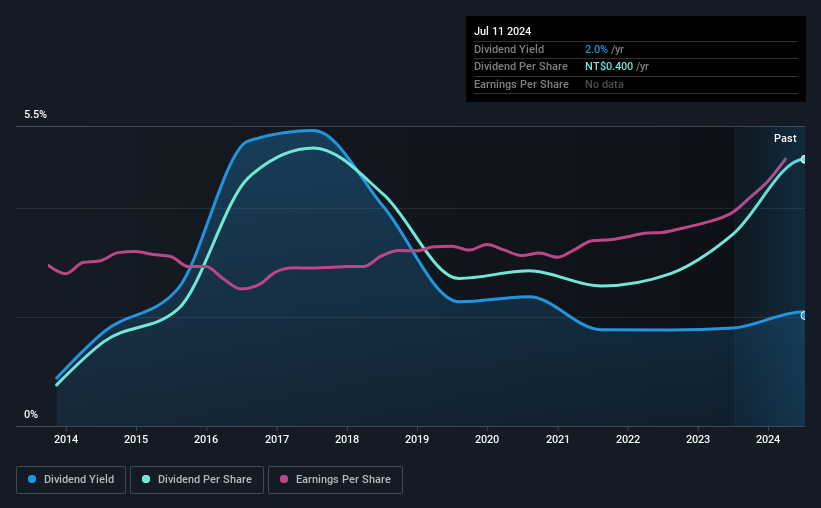Taichung Commercial Bank's (TWSE:2812) Upcoming Dividend Will Be Larger Than Last Year's

Taichung Commercial Bank Co., Ltd.'s (TWSE:2812) dividend will be increasing from last year's payment of the same period to NT$0.40 on 21st of August. Despite this raise, the dividend yield of 2.0% is only a modest boost to shareholder returns.
See our latest analysis for Taichung Commercial Bank
Taichung Commercial Bank's Earnings Will Easily Cover The Distributions
If it is predictable over a long period, even low dividend yields can be attractive.
Having distributed dividends for at least 10 years, Taichung Commercial Bank has a long history of paying out a part of its earnings to shareholders. Taking data from its last earnings report, calculating for the company's payout ratio shows 28%, which means that Taichung Commercial Bank would be able to pay its last dividend without pressure on the balance sheet.
Over the next year, EPS could expand by 8.3% if recent trends continue. If the dividend continues along recent trends, we estimate the future payout ratio will be 27%, which is in the range that makes us comfortable with the sustainability of the dividend.

Dividend Volatility
The company's dividend history has been marked by instability, with at least one cut in the last 10 years. Since 2014, the dividend has gone from NT$0.0617 total annually to NT$0.40. This means that it has been growing its distributions at 21% per annum over that time. Dividends have grown rapidly over this time, but with cuts in the past we are not certain that this stock will be a reliable source of income in the future.
Taichung Commercial Bank Could Grow Its Dividend
Given that the dividend has been cut in the past, we need to check if earnings are growing and if that might lead to stronger dividends in the future. Taichung Commercial Bank has impressed us by growing EPS at 8.3% per year over the past five years. A low payout ratio and decent growth suggests that the company is reinvesting well, and it also has plenty of room to increase the dividend over time.
Taichung Commercial Bank Looks Like A Great Dividend Stock
Overall, a dividend increase is always good, and we think that Taichung Commercial Bank is a strong income stock thanks to its track record and growing earnings. The company is easily earning enough to cover its dividend payments and it is great to see that these earnings are being translated into cash flow. Taking this all into consideration, this looks like it could be a good dividend opportunity.
Investors generally tend to favour companies with a consistent, stable dividend policy as opposed to those operating an irregular one. However, there are other things to consider for investors when analysing stock performance. For example, we've picked out 1 warning sign for Taichung Commercial Bank that investors should know about before committing capital to this stock. If you are a dividend investor, you might also want to look at our curated list of high yield dividend stocks.
Valuation is complex, but we're here to simplify it.
Discover if Taichung Commercial Bank might be undervalued or overvalued with our detailed analysis, featuring fair value estimates, potential risks, dividends, insider trades, and its financial condition.
Access Free AnalysisHave feedback on this article? Concerned about the content? Get in touch with us directly. Alternatively, email editorial-team (at) simplywallst.com.
This article by Simply Wall St is general in nature. We provide commentary based on historical data and analyst forecasts only using an unbiased methodology and our articles are not intended to be financial advice. It does not constitute a recommendation to buy or sell any stock, and does not take account of your objectives, or your financial situation. We aim to bring you long-term focused analysis driven by fundamental data. Note that our analysis may not factor in the latest price-sensitive company announcements or qualitative material. Simply Wall St has no position in any stocks mentioned.
Have feedback on this article? Concerned about the content? Get in touch with us directly. Alternatively, email editorial-team@simplywallst.com
About TWSE:2812
Taichung Commercial Bank
Provides various banking products and services in Taiwan.
Flawless balance sheet with acceptable track record.
Market Insights
Community Narratives




